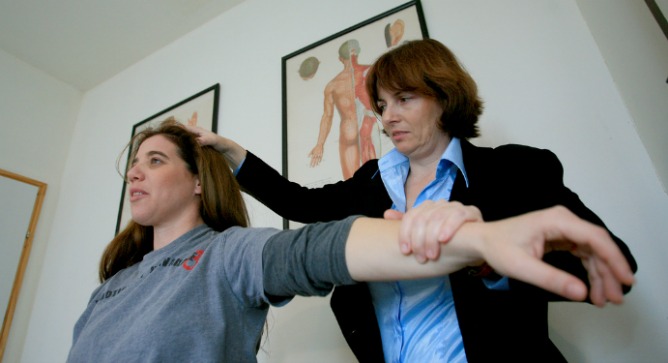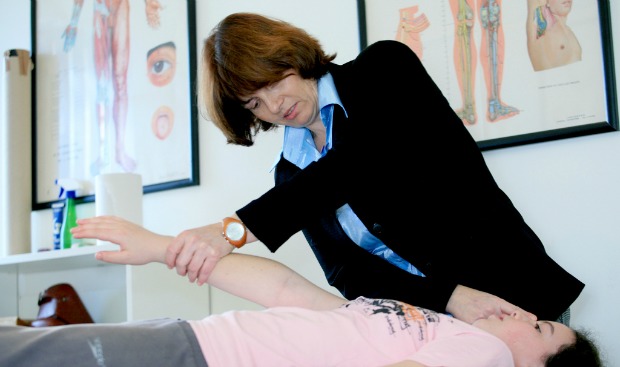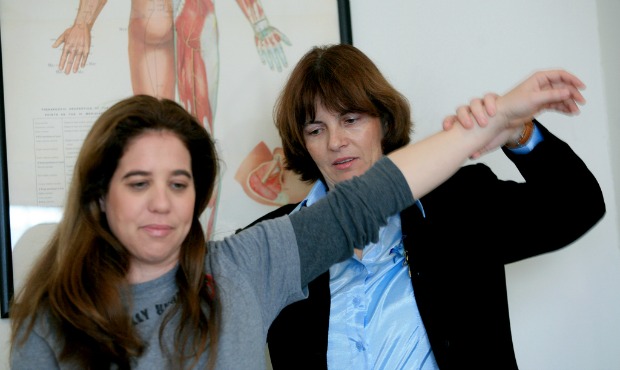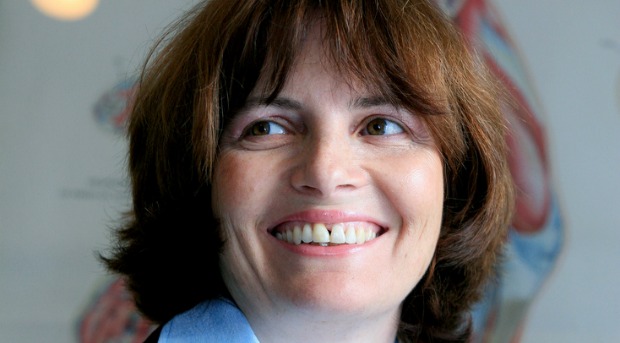Every month, more than a thousand Israelis and foreigners come to Kibbutz Nachsholim, on Israel’s northern Mediterranean shore, seeking a cure for anxieties. Whether the fear relates to athletic performance, appearing on stage, test taking, dating, driving, flying — you name it – they trust Dr. Ora Golan and her staff at the Ora Golan Center for Functional Medicine to help them overcome it in four 20-minute sessions.
“The emotional system is so universal, it doesn’t matter where you come from or what your complaint is,” she tells ISRAEL21c.
Spread the Word
• Email this article to friends or colleagues
• Share this article on Facebook or Twitter
• Write about and link to this article on your blog
• Local relevancy? Send this article to your local press
The Haifa-born Golan, 53, is not a psychologist. A US-trained chiropractor, she invented a technique called “emotional blocks elimination” that starts with evaluating muscular strength against resistance.
“An emotionally charged issue will cause a strong muscle to be temporarily weak,” Golan explains. ”I don’t diagnose. I identify and eliminate emotional blocks that cause our behavior, decision-making and reactions – all aspects of life personally and professionally. The treatment concentrates on how we approach failure, competition and success.”
In 1990, she opened a clinic on Manhattan’s Park Avenue and another in the borough of Queens, where she lived with her husband, Ron. Their return to Israel after 15 years in New York was not a result of failure; on the contrary, Golan had built up a huge practice and claims a success rate of 85 percent.
“I was very busy even without advertising — busier than I could handle,” Golan says.
People were coming from all over to see her in New York, so why not to Israel?
“When we had our two kids, we wanted to come back to Israel to be near family,” she explains. “I always dreamed of living on the beach, and at Kibbutz Nachsholim we realized that dream.”
An emotional component
Appointments with Golan herself are booked 18 months in advance, but 10 practitioners trained in her method treat patients from age six and up. Golan, who has worked with newborns to centenarians, still practices chiropractic as well.
She went into the field, which was virtually unknown in Israel when she was growing up, after hearing how it cured her sister’s future father-in-law of chronic headaches. Following army service, she headed to New York Chiropractic College to begin seven years of study.
In 1987 she was working in a clinic specializing in chronic health problems, and saw that many patients were not getting relief from the usual techniques. She felt there was an emotional component that was being overlooked. “Today we hear a lot about the body-mind connection, but then it was not so common,” she says.
One of her patients responded well to a technique developed in the 1960s called applied kinesiology. “It’s extremely effective to get information on body structure, to see if a particular muscle is weak and why, and also to see if the patient is allergic to something.”
Over the next couple of years, Golan put together elements of this and other approaches to form her own method.
She gives an eight-month training session; there is no recognized program or licensing for emotional blocks elimination. “We are working on research and I want more academic acknowledgement for it to become a profession,” she says. “It’s important to do the treatment properly and be professionally recognized.”
Achieving potential
Athletes are among Golan’s most loyal following. “They have to handle a lot of stress and often have a gap between potential and performance. The treatment minimizes that gap,” she says. “I cannot give an athlete potential they don’t have.”
One of her patients was Alon Mandel, a swimmer who represented Israel at the 2008 Beijing Olympics. When he arrived in China, he received word that his father had been killed in an accident. His decision to remain and compete was facilitated by a phone consultation with Golan. Though he didn’t win a medal, he did break his own record.
She also sees many “chronic singles” who have difficulty establishing or sustaining a relationship.
“We have done the treatment on men and women who didn’t have a date for 10 years,” Golan says. “A religious woman in her 40s, never married, came about two years ago and found someone not long afterward. Four months ago, she had her first son.”
Her clinic treats kids and adults suffering from anxiety, anger bursts, low self-esteem, poor body image, impulsiveness, marital difficulties, attention deficit disorder and extreme shyness.
“I don’t like to be the judge and say I cannot help,” says Golan. “I don’t want to take money for a case in which I don’t have experience. Yet, I am often surprised with the effectiveness of the treatment.”
The approach is the same regardless of the specific problem. “We eliminate emotional blocks from the physiological memory, and then the body has more resources to achieve potential,” Golan says. “Instead of responding with anxiety or fear, you can be calm, relaxed, creative and focused.”
Photos by Moshe Shai for the Ora Golan Center

















